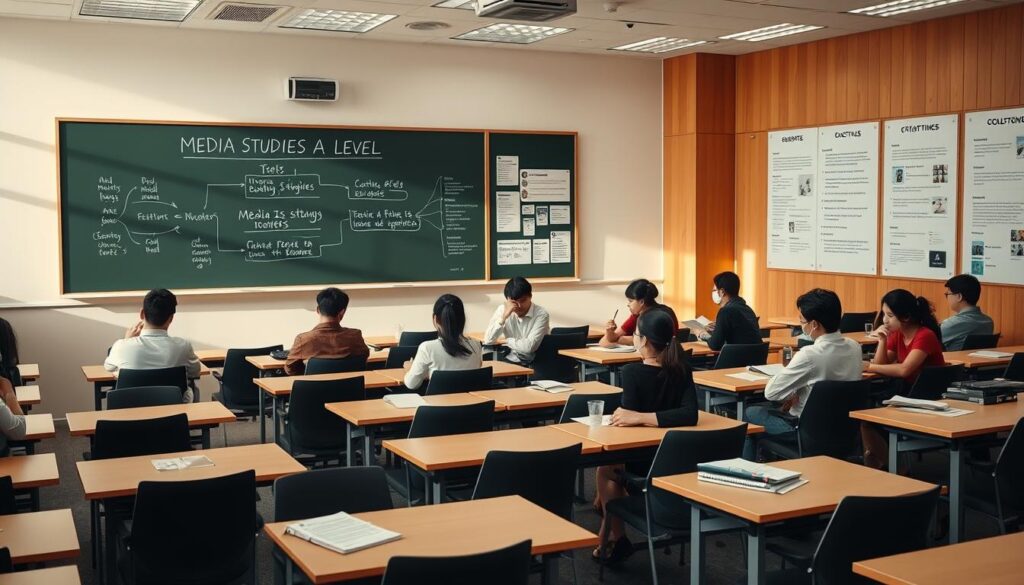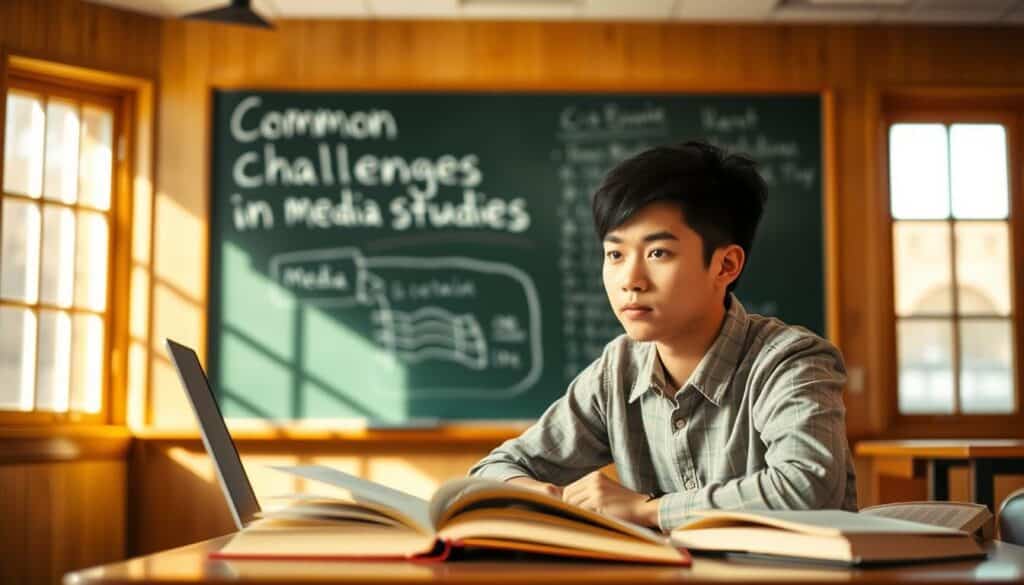Did you know that 64% of students find Media Studies A Level challenging due to its unique blend of theoretical and practical demands? This two-year course, offered by WJEC, requires 4.5 timetable hours per week and includes a mix of theory, media analysis, and creative projects. Students must prepare for two exams and two practical projects, making it essential to approach the subject with a strategic mindset.
The course is designed to develop critical thinking, written communication, and media production skills. However, many students struggle with balancing these elements. Common pitfalls include unbalanced practical projects and inadequate digital convergence, which can significantly impact final grades. Additionally, the Statement of Intent is a critical component that, if omitted or incomplete, results in a 10-mark penalty.
At Getutor, we specialize in connecting students with expert tutors who provide personalized guidance. Our tutors help students master both theoretical frameworks and practical media analysis, ensuring they are well-prepared for exams and projects. We are committed to delivering reliable, efficient, and personalized support to help students excel in their Media Studies A Level journey.
For parents in Hong Kong seeking educational excellence, our free tutor matching service offers a tailored approach to learning. With our support, students can overcome academic struggles and achieve their full potential in this dynamic and rewarding subject.
Key Takeaways
- Media Studies A Level requires a balance of theoretical knowledge and practical skills.
- Expert tutoring can help students overcome common challenges and excel.
- Personalized learning support is crucial for academic success.
- Getutor offers free tutor matching to connect students with the right guidance.
- Mastering both theory and practice is key to achieving top grades.
Introduction to A-Level Media Studies
Discover how A-Level Media Studies equips students with essential skills to analyze and create media content. This dynamic course is designed for those passionate about understanding media’s role in shaping our world.
Course Overview and Content
The A-Level Media Studies curriculum is divided into theoretical and practical components. Students explore various media forms, including television, advertising, and online media, while developing strong written and communication skills.
The course assessments include two exams, each worth 35%, and two practical projects, each worth 30%. These assessments evaluate both analytical and creative abilities.
Key Theoretical and Practical Components
Theoretical learning focuses on understanding media language, representation, and audiences. Practical tasks involve creating media products, such as videos or print materials, applying theoretical concepts.
This balanced approach ensures students gain both academic and practical mastery, preparing them for future challenges in media-related fields.

| Component | Description | Weight |
|---|---|---|
| Theoretical Knowledge | Analysis of media texts and language | 70% |
| Practical Projects | Creation of media products | 30% |
Mastering Media Studies A Level
Exceling in Media Studies A Level requires a strategic approach that balances theoretical understanding with practical application. Students need to develop strong analytical and creative skills to succeed in this dynamic subject.
Deep Dive into Theory and Media Analysis
Start by mastering key theoretical frameworks such as media language, representation, and audiences. Regularly engage with various media forms like films, advertisements, and digital content to deepen your understanding. Analyzing media texts and contexts helps build critical thinking skills, essential for high grades.
Practical media production is equally important. Focus on creating high-quality projects that demonstrate your ability to apply theoretical concepts. Whether it’s a video or print material, ensure your work showcases creativity and attention to detail.
Effective Study Techniques and Exam Preparation
Develop a structured study plan that allocates time for both theoretical learning and practical tasks. Regular revision and engagement with past exam papers will help you understand the assessment structure and expectations.
| Strategy | Details |
|---|---|
| Regular Revision | Review notes and discuss current media trends |
| Practical Application | Engage in media production tasks |
| Past Papers | Familiarize yourself with exam structure |

Common Challenges and Pitfalls in Media Studies
Understanding the challenges in Media Studies A Level is crucial for success. Many students face difficulties in balancing theory with practical work, while others struggle with exam stress. Gaining insight into these issues can help you avoid common mistakes and improve your performance.
Identifying Frequent Struggles
One major challenge is balancing theoretical studies with practical assignments. Students often find it hard to manage their time effectively, leading to rushed projects and inadequate preparation for exams. Additionally, misinterpreting media texts and providing shallow analysis in creative projects are common pitfalls that can lower grades.
Avoiding Critical Mistakes in Coursework and Exams
Coursework mistakes often stem from misinterpreting media texts or inadequate analysis in creative projects. During exams, poor time management and failure to address all parts of the question can lead to lost marks. For instance, not focusing on genre analysis or neglecting the “to what extent” part of a question can weaken your analysis.
Understanding Entry Requirements and Assessment Demands
| Component | Weight | Description |
|---|---|---|
| Theoretical Exams | 70% | Covers media language and representation |
| Practical Projects | 30% | Includes media production tasks |
Entry requirements include a minimum of 4 in English Language GCSE. The course is assessed through exams (70%) and practical projects (30%). Proactive study habits and structured revision are essential to meet these demands and avoid critical mistakes.

Strategies to Excel in Media Studies
Success in Media Studies A Level demands a well-rounded approach that combines theoretical insights with practical skills. To stand out, students need effective strategies that address both academic challenges and creative demands.
Overcoming Obstacles with Expert Guidance
Expert tutoring plays a pivotal role in helping students master complex concepts and refine their study techniques. Private tutors offer personalized support, ensuring that each student’s learning style and pace are catered to. This tailored approach not only enhances understanding but also boosts confidence.
How a Private Tutor Can Boost Your Success
A qualified tutor can make a significant difference in exam preparation and project development. They provide clarity on difficult topics and offer constructive feedback, helping students achieve their full potential. With a private tutor, students can:
- Clarify complex theoretical concepts
- Improve exam techniques
- Enhance creative project development
At Getutor, we offer a free tutor matching service that connects students with the best tutors for their needs. Our tutors specialize in breaking down intricate information, helping students develop a confident grasp of media texts. Proactive engagement with tutors ensures continuous improvement and readiness for further studies in the media world.

Conclusion
Mastery of the A-Level Media Studies course is achievable with the right approach and support. This comprehensive guide has outlined the essential strategies to avoid common pitfalls and excel in both theoretical and practical aspects.
The course structure blends theory with hands-on projects, preparing students for exams and creative challenges. Emphasizing effective study habits, active engagement with complex concepts, and consistent revision is crucial for success.
Expert tutoring plays a vital role in clarifying difficult topics and refining study techniques. At Getutor, we offer personalized academic support through our free tutor matching service, ensuring each student receives tailored guidance.
With the right strategies and expert help, achieving academic excellence in media studies is within reach. Remember, success in this dynamic field is not just about grades—it’s about building skills that will empower your future.
At Getutor, we are committed to supporting your journey, helping you unlock your full potential and thrive in your academic and future endeavors.
FAQ
What is the structure of the A-Level Media Studies course?
The A-Level Media Studies course is divided into theoretical and practical components. Students explore media industries, audiences, and representations, while also developing skills in media production. The course is assessed through a combination of exams, coursework, and practical projects.
How can I improve my media analysis skills?
To improve your media analysis skills, focus on understanding key theories like representation, ideology, and audience studies. Practice analyzing a variety of media texts, such as films, advertisements, and news articles, and review sample exam questions to familiarize yourself with the expected standards.
What are the most common challenges students face in Media Studies?
Students often struggle with balancing theoretical knowledge and practical production, as well as meeting tight deadlines for coursework. Additionally, understanding complex theories and applying them to real-world examples can be challenging for some learners.
How can a private tutor help me succeed in Media Studies?
A private tutor can provide personalized guidance, helping you grasp difficult concepts, refine your analytical skills, and improve your production techniques. They can also offer tailored study plans and feedback on your work to ensure you meet your academic goals.
What are the entry requirements for A-Level Media Studies?
Entry requirements typically include a strong GCSE grade in English or a related subject, as well as a demonstrated interest in media and its cultural impact. Some schools may also require a portfolio of creative work or a personal statement.
How does Media Studies compare to other A-Level subjects?
Media Studies combines theoretical and practical learning, making it unique compared to purely academic subjects. It’s ideal for students who enjoy creative work, critical thinking, and understanding contemporary culture.
What resources are best for studying Media Studies?
Recommended resources include textbooks on media theory, online platforms like BBC Bitesize, and academic journals. Additionally, studying real-world media examples, such as films and advertisements, will enhance your understanding of key concepts.
How can I prepare for Media Studies exams effectively?
Start by reviewing past exam papers and practicing essay questions. Focus on understanding the assessment criteria and developing clear, well-structured arguments. Regular revision and active participation in class discussions will also strengthen your exam performance.
What role do parents play in supporting students studying Media Studies?
Parents can support students by encouraging regular study routines, providing a quiet study environment, and staying informed about their progress. Engaging in discussions about media topics can also help students develop their critical thinking skills.


